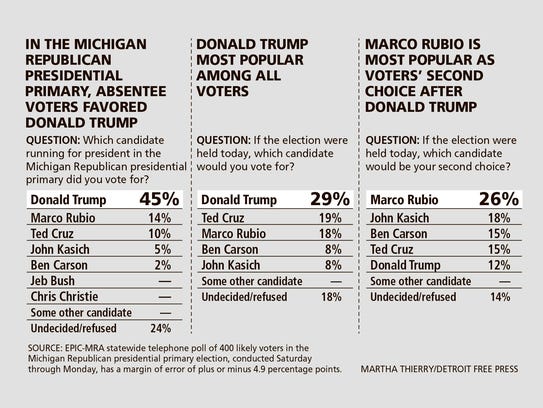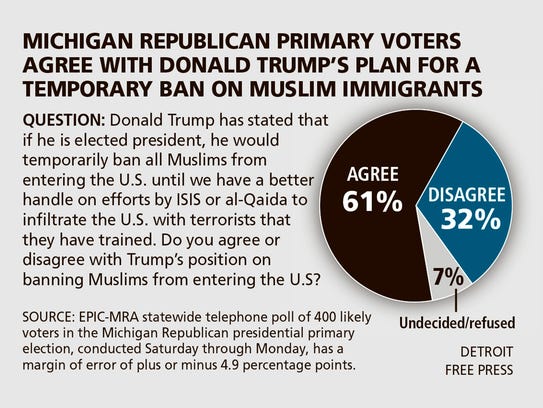Results 1 to 1 of 1
Thread Information
Users Browsing this Thread
There are currently 1 users browsing this thread. (0 members and 1 guests)
-
03-03-2016, 01:00 AM #1
Poll: Trump holds 10-point lead in Michigan GOP primary
Todd Spangler, Detroit Free Press 2:51 p.m. EST March 2, 201
With debate on tap Thursday in Detroit, Trump - fresh off Super Tuesday wins - holds big lead in Michigan
he Republican presidential candidates come to Detroit to debate Thursday night at the Fox Theatre with businessman Donald Trump maintaining a 10-point lead on his closest competitors in Michigan's March 8 primary in a new poll commissioned by the Free Press and other media outlets.
According to the poll, Trump, who scored key wins in seven of the 11 states making their GOP picks Tuesday and holds a sizeable lead in delegates needed to secure the GOP nomination, remains the presumptive favorite. Some 29% of those surveyed backing him outright, or were leaning toward doing so in next Tuesday’s Republican primary in Michigan, compared to 19% for U.S. Sen. Ted Cruz of Texas and 18% for U.S. Sen. Marco Rubio of Florida. The poll, which surveyed 400 likely Republican primary voters Saturday through Monday, has a margin of error of plus or minus 4.9 percentage points.
But while Trump enjoys an unmistakable lead in the state -- which could be bolstered by his Super Tuesday success and if he does well in Thursday's debate -- there still were signs of encouragement for those trailing him: His lead was well below those in some others taken before last week’s debate in Houston where Cruz and Rubio took turns attacking Trump’s dealings and political stances.
And with Cruz -- who won three states on Super Tuesday -- and Rubio still enjoying higher favorability ratings than Trump, along with an unsettled electorate -- 18% of which remained undecided -- Thursday’s debate in Detroit could represent a last-ditch effort to slow Trump heading into Tuesday’s primary and next week’s key winner-take-all contests in Ohio and Florida.

Results of a poll of Michigan Republican primary voters showing top presidential choices. (Photo: Martha Thierry/Detroit Free Press)
“I expected a larger lead for Trump given all the other polls,” said Bernie Porn, the pollster for EPIC-MRA of Lansing, for the Free Press, WXYZ-TV Detroit and their outstate polling partners. Porn added that while he considers it likely Trump will win Michigan, other factors, like the debate and late-breaking TV ads against him, could cut into that lead.
FOX News Channel is hosting Thursday night’s debate in Detroit, welcoming Trump back after he declined to participate in the last one held by the network Jan. 28 in Iowa. The 2-hour debate begins at 9 p.m. with Bret Baier, Megyn Kelly and Chris Wallace returning as moderators.
The debate will turn the political spotlight squarely on Michigan, which with its 59 delegates to award, is the biggest prize among states voting March 8. Others include Hawaii, Idaho and Mississippi. Four other states, Kansas, Kentucky, Louisiana and Maine, have nominating contests in the meantime, on Saturday.
Even before Super Tuesday’s outcomes were known, many of the candidates already were making plans for Michigan, with Rubio announcing a Wednesday event in Shelby Township, and Trump making plans for Friday rallies in Warren and Cadillac. Ohio Gov. John Kasich, meanwhile, has been a near-constant presence in the state since coming in second in New Hampshire nearly a month ago, hoping he could set the stage for a home win next week.
But, according to the poll, Kasich’s efforts haven’t made much of a dent in Michigan. With Trump, Cruz and Rubio, who won one state -- Minnesota-- on Tuesday -- splitting nearly two-thirds of the vote, Kasich was a distant fourth with 8%; while retired neurosurgeon Ben Carson, who grew up in Detroit, was at 7%.
Carson announced Wednesday afternoon that he would not be at the debate as he sees "no political path forward" for him in the presidential race. He stopped short of suspending his campaign.
Kasich failed to win a state on Super Tuesday and it’s likely he could leave the race if he loses in Michigan and the following week in his home state of Ohio.
While this latest poll shows a smaller lead than some others for Trump, it still underscored the breadth of his support. In metro Detroit, the most populous part of the state, Trump enjoyed 39% of the support, with Cruz and Rubio more than 20 percentage points behind. In fact, Trump led in all areas of the state except one -- west Michigan -- where Cruz led the New York businessman 33%-20%.
Trump led with all age groups but one, those aged 18-34 years, who split between Cruz and Rubio with 30% each to Trump’s 22%. Likewise, Trump led with voters of all education levels, tying only with Rubio at 22% with those who had college degrees. Trump was in the lead or in a virtual tie with voters regardless of religion, though Cruz did slightly better with self-described evangelicals or born-again Christians.
Trump also led across income levels and genders. And one of his greatest advantages could be among absentee voters, with the poll showing 45% of those who voted absentee giving him their support. That far out paces Rubio, who was second with 14%, though 24% declined to say who they supported. As the Free Press reported earlier this week, 278,000 absentee ballots already have been returned among 489,000 requested -- that’s compared to 393,000 absentee ballots cast four years ago.
Michael Traugott, at the Center for Political Studies at the University of Michigan, said that for all the suggestions that Trump would or could be stopped by a more establishment-friendly candidate, the 2016 election season actually seems to be running to form, with the same sharp narrowing of the field we’ve seen in other recent years. But this time, it’s not the choice of party elders who is winning.
“The Republican Party leadership-establishment are now beginning to pay attention to the problems of a Trump candidacy, but it’s probably too late to hold him back,” said Traugott. “The rest of the field seems to be just large enough to divide up the non-Trump vote into relatively small pieces.”
Traugott said he’s not surprised Trump could do well in Michigan, either, where his populist preaching can strike a chord with anxious working-class voters, or those who share his hard line on immigration, particularly for Muslims and those from the Middle East, who have a sizeable population in the state. He said given Trump’s poll numbers, it appeared to him it would require “some extreme event” for him not to win Tuesday.

Chart showing primary voters' response to Donald Trump's proposed plan to ban Muslim immigrants. (Photo: Martha Thierry/Detroit Free Press)
Thursday’s debate may not provide such an event, but it’s almost certain that the other candidates will continue to try to assail Trump over his past business dealings, financial support for Democrats and radical proposals, such as vaguely suggesting in the past that he would block Ford Motor Co. from moving any production to Mexico or unilaterally impose onerous taxes on the company. His initial reluctance to disavow white supremacists last week, which other Republicans decried, almost certainly will be discussed as well.
The water crisis in Flint, too, is likely to come up, though the issue of high concentrations of lead found in some residents’ taps there has been far less of a debate issue in the Republican contest than it has on the Democratic side. Both Hillary Clinton and Bernie Sanders have focused on it, and will debate in Flint Sunday in advance of Tuesday’s primary.
If anyone has a chance to eat into Trump’s lead in Michigan, it may be Rubio. While in a virtual tie with Cruz for second, Rubio’s favorable rating, at 64%, is higher than anyone in the field other than Carson; and his unfavorable ratings, at 26%, are far lower than Trump’s at 43% and Cruz’s at 33%. Rubio also has the benefit of being the second choice for more of those surveyed than the other candidates, suggesting he could do well with voters who make up their minds late or decide to change their vote.
On the other hand, however, Cruz’s Super Tuesday victories in Alaska, Oklahoma and his home state of Texas boost his argument that he has been the only other Republican candidate who has been able to notch multiple wins over Trump.
Political consultant John Truscott said that it still seems unlikely anyone is going to upend Trump in Michigan at this late date, though it is possible Rubio may be able to do so down the road if other states -- particularly the large winner-take-all states like his home state of Florida -- break his way. He’s not predicting that will happen, however. And if it does, he believes it will be a hard, divisive fight.
“Right now, seeing the clips of the news, it looks like a cafeteria food fight,” said Truscott, who said he would like to see more discussion of policy and less mudslinging. “It’s pretty nasty and fairly petty. (And) I think it’s more of that.”
http://www.freep.com/story/news/poli...mary/81200942/Support our FIGHT AGAINST illegal immigration & Amnesty by joining our E-mail Alerts at https://eepurl.com/cktGTn
Similar Threads
-
SEC Primary: Donald Trump Has A 17-Point Lead In New Alabama Poll
By Jean in forum General DiscussionReplies: 0Last Post: 02-25-2016, 07:00 PM -
Poll: Trump holds 8-point lead over Cruz in Iowa
By Judy in forum General DiscussionReplies: 0Last Post: 01-28-2016, 06:52 PM -
PPP Poll: Trump Has 14-Point Lead in New Hampshire
By Jean in forum General DiscussionReplies: 1Last Post: 01-06-2016, 11:51 PM -
Pew poll: Donald Trump holds commanding lead
By Judy in forum General DiscussionReplies: 2Last Post: 10-02-2015, 10:45 PM -
Poll: Walker Holds Firm Lead Over Trump in Iowa
By MW in forum General DiscussionReplies: 7Last Post: 07-21-2015, 10:07 AM


 LinkBack URL
LinkBack URL About LinkBacks
About LinkBacks




 Reply With Quote
Reply With Quote


Durbin pushes voting rights for illegal aliens without public...
04-25-2024, 09:10 PM in Non-Citizen & illegal migrant voters